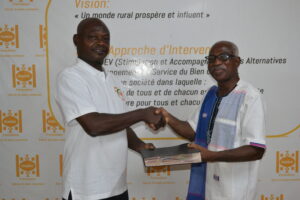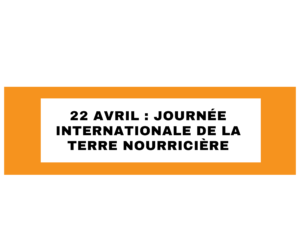

Abidjan, September 13, 2023 – for immediate release
In less than a month’s time, on October 1, as is customary, cocoa producers in Côte d’Ivoire will know the cocoa purchase price for the main 2023-2024 season. As we enter September, the Plateforme Ivoirienne pour le Cacao Durable (Ivorian Platform for Sustainable Cocoa) would like to share the hopes of our producers.
In recent months, the price of cocoa on the international market has risen to its highest level for over 7 years. As a result, cocoa growers continue to hope for an edge-of-field cocoa price that reflects the rise seen on the international market.
All the more so since the Ivorian government is committed to ensuring that “the edge-of-field price is set at at least 60% of the international price (CAF price)”, as reiterated by the Vice-President of the Republic on September 30, 2022, on the occasion of the national coffee-cocoa days (JNCC).
The Ivorian Platform for Sustainable Cocoa welcomes the government’s efforts to achieve a decent income for cocoa producers in Côte d’Ivoire. It would nevertheless like to draw attention to a few points for consideration in order to achieve this major objective for the sustainability of the cocoa economy, a vital sector for our country.
Reminder of the price of the 2022-2023 campaign and its impact
For the 2022-2023 campaign, the on-board cocoa price has been set at 900 FCFA. This price was 75 FCFA higher than in the previous main season. But despite this increase, the price was not enough to significantly improve the situation of producers.
In fact, as several studies have shown, the production cost of cocoa is estimated at 677.211 FCFA/Kg. If we deduct this production cost from the farm-gate price set at 900 for the 2022-2023 season, we are left with real income of just 222.79 FCFA.
Based on field prices for the 2022-2023 season, the income of an average grower with 3 hectares and an average yield of 500 kg/ha is 1,350,000 FCFA, or 112,500 F.CFA/month. This amount is a far cry from the living wage estimated at 262,000 F.CFA/month in 2017 by CIRES2.
. Even if there has been no similar study since 2017, it is certain that the costs of
production costs have increased since 2017, particularly in view of the international context and inflation observed in recent years.
For the Plateforme Ivoirienne pour le Cacao Durable (Ivorian Platform for Sustainable Cocoa), this situation is likely to jeopardize the sustainability of the cocoa sector, as cocoa producers are unable to make a living from their work and make the necessary investments for sustainable cocoa.
A minimum field price of 1,300 FCFA for the main 2023-2024 season
Bearing in mind this precarious situation and the risk it entails for the Ivorian economy, given the strategic place of cocoa in our economy, and based on price trends on the international market over the last few months, producers are expecting a minimum price of 1,300 FCFA for the main 2023-2023 campaign.
Indeed, since the beginning of 2023, the price of a tonne of cocoa on the international market has risen steadily, from $2,560 in January to $3,660 in September 2023 on the New York market, and from £1,994 to £2,990 on the London market over the same period.
The minimum in-field price of 1,300 FCFA per kilo of cocoa that farmers expect represents 60% of the international market price. This is a firm commitment on the part of the government, as reiterated by the Vice-President of the Republic on September 30, 2022, on the occasion of National Coffee-Cocoa Day (JNCC). This estimate, based on a summary of prices on the international market since the beginning of 2023, is very conservative.
It is also all the more realistic in that it does not even take into account other data that could have increased it, such as the decent income differential (DRD) set at $400 per tonne.
This expectation on the part of producers is all the more legitimate in view of the high cost of living in the past, and even more so today. In recent weeks, prices of staple foods such as rice, oil and sugar have risen again. At a time when they are merely surviving, this situation is likely to exacerbate the precariousness of producers.
In addition to foodstuffs, prices of inputs and plantation treatment products for improved productivity are also rising. For growers, this makes it even more difficult to make the investments they need to maintain their plots and avoid expanding their acreage, which is to the detriment of the forest and the forest floor.
biodiversity.
It would be difficult for growers to understand why the authorities do not take such factors into account when setting the farm-gate price for the coming season. All the more so as the Ghanaian government has just announced the field price for the 2023-2024 season at 1308.99 cedis, or around 1,126 FCFA. A low field price in Côte d’Ivoire could lead to a flight of production, given the proximity between our countries.
From a living wage to a decent income
Looking beyond the 2023-2024 cocoa season, the Ivorian Platform for Sustainable Cocoa is calling for discussions on the field price, set at 60% of the international market price. Producers must move from a state of survival to a dignified standard of living.
It is for this reason, and in the name of the alignment efforts undertaken between Côte d’Ivoire and Ghana in particular, that it is necessary to open discussions on this 60% rate as a reference for setting the field price. The platform is asking the Ivorian authorities to consider its recommendation, which is to set the field price at at least 70% of the international market price , as has already been the case in neighboring Ghana for several years now. This would have a definite impact on producers’ purchasing power.
We are aware of the Ivorian government’s efforts to improve the living conditions of producers and the farming community in general. We welcomed and supported the boycott by the regulator, the Conseil du Café-Cacao, of the annual meeting of the World Cocoa Foundation in October 2022. We welcomed and strongly support the
Ivorian and Ghanaian authorities to pool their efforts and work together for the well-being of producers in both countries. This rapprochement has led to the creation of the Côte d’Ivoire Ghana Cocoa Initiative (ICCIGH), one of whose aims is to harmonize cocoa field prices in our sub-region in order to combat cocoa smuggling, of which Côte d’Ivoire is also a major victim. Aligning the rate for setting the edge-of-field price would be a major step towards achieving this major objective.
The Plateforme Ivoirienne pour le Cacao Durable (Ivorian Platform for Sustainable Cocoa) reiterates its willingness to work with the Ivorian government to achieve its common objectives, in particular the elimination of precariousness among cocoa producers and the creation of a sustainable cocoa sector.
About the Ivorian Platform for Sustainable Cocoa (PICD)
The Ivorian Platform for Sustainable Cocoa is a network of cocoa producer organizations and non-profit non-governmental organizations. Today, it includes 55 producer organizations and 11 NGOs.
Press contact:
Pauline ZEI: pauline.zei@inadesfo.net – +225 0101044644
Bakary Traoré: bakary.traore@ongidef.org – +225 0749102193











